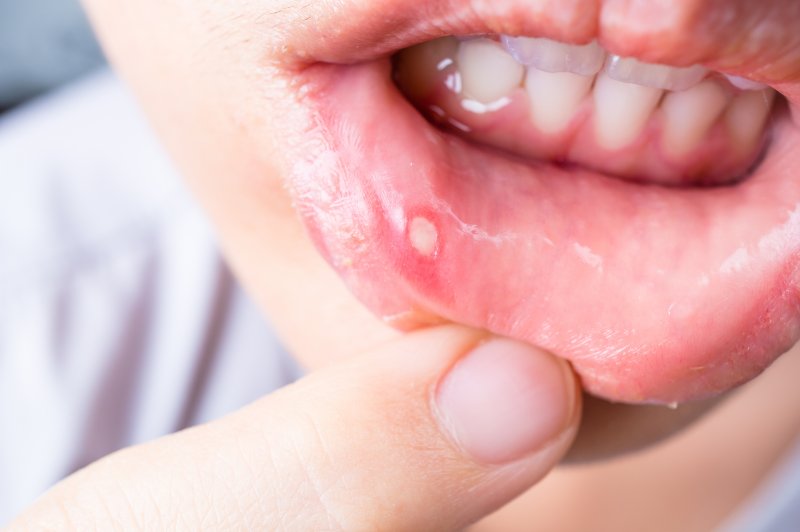
Not only are oral sores uncomfortable, but they can be distracting and take away from your appearance. There are several different types of sores that can occur in and around the mouth, so there are a variety of different causes. If you notice that you have an oral sore, it’s important to take the right steps to treat it before it can cause further issues. Continue reading to learn about the different types of sores, their causes, and what you should do.
2 Types of Mouth Sores
An oral sore can describe many different conditions. These are two of the most common ones:
- Canker Sores: A canker sore, also known as a mouth ulcer, is the most common type of lesion to occur in the mouth. They can vary in size and are typically round in shape. They can appear white or yellow. Fortunately, they aren’t usually a big deal as they aren’t contagious and generally resolve themselves after about 10 to 14 days. A canker sore can occur on your gums, inside your cheeks or lips, on or below your tongue, and on the soft palate.
- Cold Sores: A cold sore is sometimes called a “fever blister.” Unlike canker sores, cold sores are contagious and can be transmitted through kissing or sharing foods and beverages. For people with a new infection, they could experience the painful development of sores on or around the lips, a sore throat, fever, body aches, headaches, and swollen lymph nodes.
What Causes Canker Sores and Cold Sores?
There are several different triggers for canker sores. Here are some of the most prominent ones:
- Injury to the inside of your mouth
- Vitamin and mineral deficiencies
- Toothpaste containing sodium lauryl sulfate
- Stress and anxiety
- Hormone fluctuations
- Food reactions
- Immune conditions, like lupus and inflammatory bowel diseases
On the other hand, cold sores are caused by the herpes virus. After you have contracted this virus, some factors can cause you to develop cold sores, like stress, fatigue, the common cold or flu, sunlight exposure, hormonal changes, and irritation to the area.
How Should Canker Sores and Cold Sores Be Treated?
Canker sores usually resolve themselves after a week or two. However, if the sore is large or very painful, this is something you should bring up with your dentist. They may recommend over-the-counter creams, prescription mouthwash, or other methods of treatment.
Cold sores also usually go away on their own within a few weeks. However, there are some treatments that can help to ease symptoms while encouraging healing. You can find creams and gels over the counter at your local drugstore. Prescription options are also available if your doctor deems them necessary.
Oral sores can be frustrating to deal with. It is always a good idea to address anything unusual to your dentist. This way, you can discuss treatment options and work to prevent them from occurring in the future.
About the Practice
At Peterson & Cammack Family & Cosmetic Dentistry, we have a team of two skilled dentists serving the Lacey community. With their combined experience and expertise, patients can always expect a high-quality, welcoming dental experience. For more information or to schedule an appointment, visit our website or call (360) 459-4420.